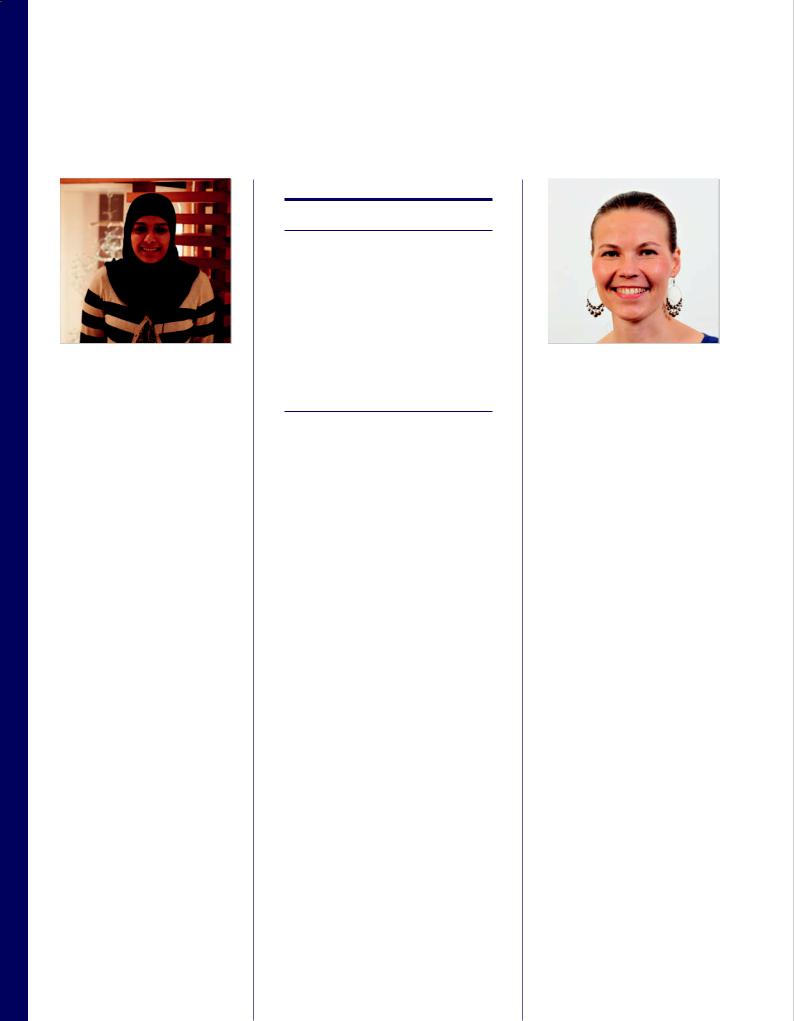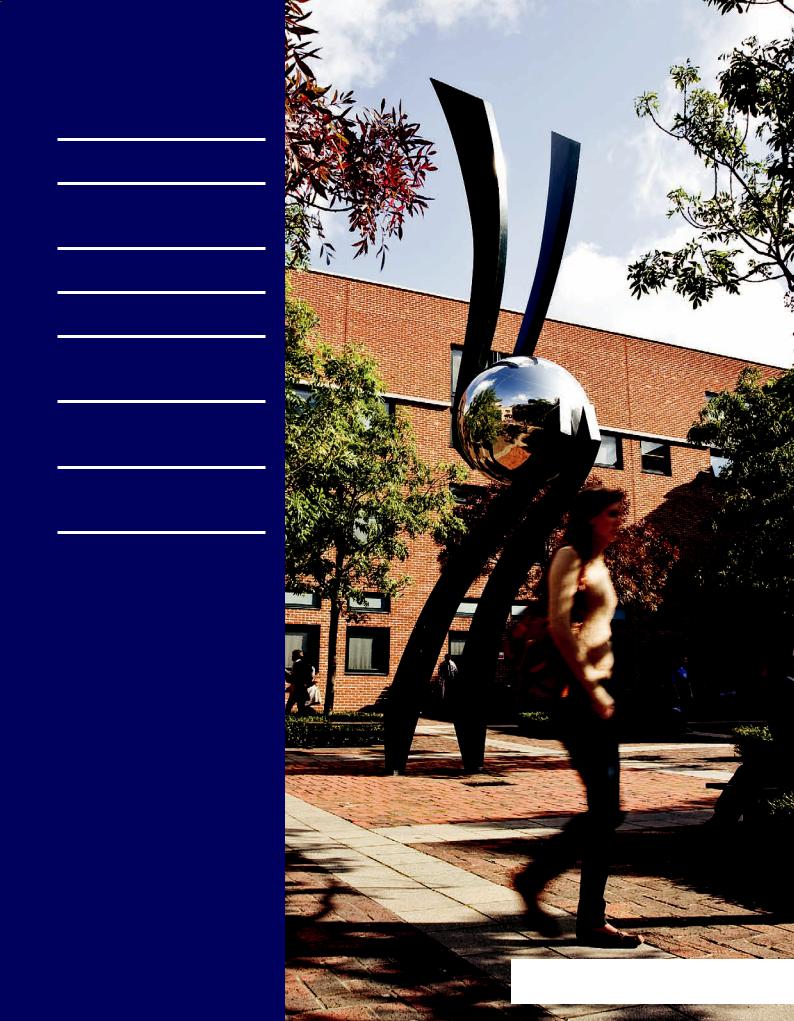
89961
.pdf
Physics and Astronomy 149
Physics with Particle Physics
F392 BSc (three years)
F393 MSci (four years)
UCAS points: 320-340
A-level: AAB-ABB
IB: 30-34 points overall with 6 in HL maths and physics (F392); 34 points overall with 6 in HL maths and physics (F393)
Excluded subjects: General studies
Find out more about these programmes and entry requirements at www.qmul.ac.uk/F392
and www.qmul.ac.uk/F393
This programme will deepen your understanding of particle physics, covering more advanced concepts than the BSc and MSci programmes in physics. For example you will gain:
•Fundamental knowledge of the standard model of particle physics
•The ability to draw Feynman diagrams
•Statistical knowledge of data analysis in particle physics
•Knowledge of basic concepts of computer programming in modern science
•The ability to apply quantum mechanical principles to the subatomic and sub-nuclear physics.
Theoretical Physics
F340 BSc (three years)
F323 MSci (four years)
UCAS points: 320-340 (F340); 340 (F323)
A-level: AAB-ABB
IB: 30-34 points overall with 6 in HL maths and physics (F340); 34 points overall with 6 in HL maths and physics (F323)
Excluded subjects: General studies
Find out more about these programmes and entry requirements at www.qmul.ac.uk/F340
and www.qmul.ac.uk/F323
This degree programme focuses on the theoretical and fundamental aspects of physics, and you will take modules leading to a knowledge of quantum theory
and general relativity, essential to understanding the fundamental forces of particle physics and gravity. In your final year you have the opportunity to carry out a research project supervised by staff from the Centre for Research in String Theory.
profile staff
Bill Spence
Head of School of Physics
and Astronomy
Why are you passionate about teaching your subject? The progress that has been made in the past hundred years in understanding the structure of
matter, the universe, and space and time itself is extraordinary, as is the fact that we can use this knowledge so effectively in creating the technological basis for societies that can consistently provide the basic needs of people first, and
on top of this can open up wonderful new ways of learning, communicating and interacting. This can be taken for granted until you gain some understanding of science, and physics in particular, and you realise how remarkable it is that we can understand so much of the physical world. On the other hand it is quite clear that there are huge areas where our knowledge is extremely limited so there is plenty to understand.
What do you enjoy most about teaching at Queen Mary? Every year seeing students inspired by their studies and going out into the world with new ambitions.
What makes your school different?
Our staff – our lecturers have high standards of professionalism and enthusiasm that informs their teaching, and this shows in myriad ways.

150 Psychology
Psychology
Psychology is the scientific study of mental processes and behaviour. At Queen Mary, psychology is seen as a natural and experimental science and is based in the School of Biological and Chemical Sciences.
If you’re fascinated by questions such as:
•Do humans and non-human animals think alike?
•Can we predict the behaviour of individuals and groups?
•How do we perceive colour and remember things?
•Why do groups sometimes come into conflict with each other?
•Why did language evolve?
•Are there sex differences in cognition and personality?
…and you would like to:
•Study psychology in the context of biology
•Gain skills for career flexibility – to work in science or non-science areas
...then a degree in psychology is ideal!
Why study psychology at Queen Mary?
At Queen Mary our approach to psychology is based on the simple observation that the brain, the seat of human and animal mind and behaviour, has evolved, and therefore must reflect facets of biological processes. This emphasis on the biological perspective differs from many other psychology degrees, which are often based within social science departments, and uniquely prepares you for further study and careers in both the biological / medical sciences and the social sciences and humanities.
In the most recent National Student Survey (NSS 2012), 88 per cent of our psychology students expressed overall satisfaction with their studies.
External examiners and stakeholders have praised the quality of our teaching: our Psychology programme was awarded among the highest number of commendations from the British Psychological Society (BPS) and external reviews of the Psychology group described our research and teaching as of the highest standard and containing high academic rigour.
Our School is distinguished by high calibre academic staff who generate a vibrant research culture and produce work that appears in highimpact multidisciplinary journals (for example Nature, Science and other top-rank specialist journals). The results of the 2008 RAE confirmed the School's leading position, with 85 per cent of our outputs assessed as being of international quality.
In recent years we have focused on recruiting enthusiastic researchoriented staff. This will ensure the continued development of the School's exciting research environment.
Assessment
For all programmes you must take eight modules in each academic year. Each module is assessed using a combination of examinations and coursework. Final-year students undertake a research project.
Our teaching
A typical psychology module will run for one semester, and comprise a combination of 22 hours of lectures and up to nine hours of practical sessions. In these practical sessions you will get hands-on experience running your own experiments, questionnaires and surveys.
These lectures and practicals are supplemented with regular tutorials in small groups of six to eight students.
Admissions
Admissions is by UCAS form. Your application will be assessed on the basis of your personal statement, UCAS reference and predicted grades. Interviews are not usually required.
Academic enquiries
School of Biological and Chemical Sciences
Tel: +44 (0)20 7882 3200/ 3014 email: sbcs-admissions@qmul.ac.uk www.sbcs.qmul.ac.uk
General enquiries
Enquiries Hotline (UK callers only): 0800 376 1800
Tel (international students): +44 (0)20 7882 5511
email: admissions@qmul.ac.uk

Psychology 151
And afterwards...
Why study psychology? What can I do afterwards?
Due to the multidisciplinary and scientific nature of this programme, you will develop an impressive range of transferable skills, including:
•Quantitative analytical research skills and numeracy
•Insight into the behaviour of individuals and groups
•Communication and critical evaluation, including report writing and presentation skills
•IT skills, including word processing, spreadsheets, statistical software usage, and web-based data searching
•Data handling and interpretation skills.
A psychology degree is a pathway to professional training in psychology (such as clinical or educational psychology) and postgraduate training (Masters, MPhil or PhD)
in the behavioural and biological sciences (such as psychology, neuroscience, social sciences, public health and epidemiology). The BSc Psychology is accredited by the British Psychological Society (BPS) as conferring eligibility for the Graduate Basis for Chartered Membership (GBC). Many psychology graduates go into highprofile non-science careers such as marketing, scientific and legal consultancy, banking and finance,
human resources and organisational management, the media, social work, teaching, and much more.
What our graduates do next
A high proportion of psychology graduates go on to further study; others will find work in a wide variety of careers. Some apply their degree
knowledge directly, entering careers such as lab technician or assistant scientist, while others transfer skills gained during study into sectors such as the media, technology or finance.
The national 2011 destination survey confirmed that 87 per cent of SBCS students were in employment and/or study six months after graduation.
Employers of our recent psychology graduates include:
•NHS and local education authorities
•university research and educational institutions
•business, management and consultancy firms
•employers in the creative industries.
How we support you
Throughout your degree, you will have access to a bespoke careers programme, to prepare you for internships and graduate-level work. This programme includes workshops on job hunting and job applications as well as employer events to help you network and explore your options.
Recent careers events in SBCS include visiting the Rutherford Appleton Laboratory, training in how to gain lab experience and a Graduate Entry to Medicine workshop led by the Medical Careers Consultant to Barts and
The London School of Medicine and Dentistry. The QM Careers Centre team also runs business games and an annual programme of over 70 employer events networking students with employers across the public, private and charity sectors.
profile alumni
Elli Kouremenou
What did you study?
Bsc Psychology (Honours)
What are you doing currently?
Working for a web-based multinational accommodation website in Berlin.
What did you enjoy most about your time here?
I loved the teaching. My professors were at the top of their field but were friendly and approachable.
I also really enjoyed the style of psychology taught, I even got a tattoo of it because I wanted the things I learnt as a budding evolutionary psychologist to stay with me forever!
What did Queen Mary do to prepare you for work?
It offered me the opportunity to do what I love in a rigorous and scientific way. My ability to stay organized and manage my time efficiently are skills that have remained with me and I get the opportunity to use daily.
Could you provide a brief description of your current role?
I do market research, which involves exploring new markets and expanding the internal database
of the company.

152 Psychology
Psychology
Degree programmes
profile student
Ujala Ilyas
BSc Psychology
“I chose to study at Queen Mary because firstly, it's located in the heart of London and it's also known for its cutting-edge research. The Psychology programme featured modules which were very closely related to the field of Psychology I wished to pursue.
“The School of Biological and Chemical Sciences at Queen Mary offers a very supportive and encouraging environment. The lecturers in the Psychology department are enthusiastic and motivating, and are the leading researchers in their field. The advisers provide excellent feedback, allowing students to progress and develop their skills and knowledge. The optional module in Psychology caters for every student, whether you're more biology orientated or have an interest in a specific field of psychology.”
Psychology
C800 BSc (three years)
UCAS points: 340 points at A2 level
A-level: AAB including at least one of the following: biology, psychology, maths, chemistry or physics
IB: 35 points overall, with psychology, maths, or a science and three other subjects at grade 6
Find out more about the programme and entry requirements at www.qmul.ac.uk/C800
This degree will provide you with a broad understanding of psychology as a natural science. You will cover the main subject areas of psychology, but these will be integrated by Queen Mary’s experimental and biological approach. Core topics include: introduction to basic psychological principles, brain and behaviour, evolution, comparative cognition, cognitive science, social and developmental psychology, personality and individual differences, and applied psychology. You will be able to conduct a finalyear project in one of several areas of psychology with support and expertise drawn from across the School.
profile staff
Dr Tiina Eilola
Lecturer in Psychology
Why are you passionate about teaching your subject? Psychology is a subject that has relevance for everyone, because it aims to explain why people behave the way they do, and thus can provide us with tools to analyse both our own behaviour as well as that of other people.
What do you enjoy most about teaching here? The varied backgrounds of our students. For example, current psychology
students speak over 25 languages. This enables the deeper appreciation of the relevance of many questions in psychology, such as whether certain aspects of human mind and behaviour (eg emotions) are universal or defined
by the person’s cultural background.
What makes your School different?
Psychology at Queen Mary emphasises the power of evolutionary theory in explaining human behaviour. Humans are understood as part of the living world – part of the tree of life.
What are your research interests?
My research interests involve the relationship between language and emotions. One of my central research questions is whether emotional content is processed differently in bilinguals’ first (L1) and second language (L2).

Psychology 153
Mohna Patel
Psychology
“I chose Queen Mary because of its academic and teaching excellence.
“The thing I have enjoyed most about Queen Mary is being able to meet a diverse range of people from all over the world that I would not have otherwise met. On top of this, the support offered by the lecturers has enabled me to understand the content of the course with great clarity, while at the same time helping me to excel in my exams.
“The cherry on top has been the growing infrastructure of Queen Mary with facilities such as new study areas, a new library etc, which has facilitated my learning, together with the great social opportunities available in this part of London.”

154 Science and Engineering Foundation Programme (SEFP)
Science and Engineering Foundation
Programme
The Science and Engineering Foundation Programme (SEFP) offers an alternative entry route onto Queen Mary degree programmes in the fields of science and engineering, and specifically caters for those applicants who do not meet the standard entry requirements.
The Science and Engineering Foundation Programme (SEFP) at Queen Mary is one of the longestrunning and most highly regarded foundation programmes in the UK. Available to both home
and international students, the programme is designed to equip you with the skills and knowledge necessary to undertake undergraduate degrees in the fields of science and engineering.
On successful completion of the programme you will be able to proceed onto degrees (usually a BSc/BEng) offered by the following departments at Queen Mary: Biological and Chemical Sciences, Electronic Engineering and Computer Science, Engineering and Materials Science, Environmental Science, Mathematics and Physics.
The programme is taught on the Mile End campus by Queen Mary staff, many of whom are also involved in teaching other undergraduate and postgraduate courses at the university.
As a foundation student you will have access to all of the university's facilities and will be a full-time student at Queen Mary.
Why study the SEFP at Queen Mary?
You will benefit from:
•a wide-range of modern accommodation located on campus
•studying at a campus-based university within easy reach of all London's attractions
•a teaching programme which is based on the main campus,
giving you full-access to all student facilities (academic, welfare, IT, library, social, sport etc)
•experienced and enthusiastic teaching staff
•the opportunity to proceed onto undergraduate degrees in a wide range of science and engineering subjects.
Learning and teaching
The SEFP academic year starts in September, and is divided into two 12-week teaching semesters
followed by a six-week examination period in May and early June. International students may also apply for the seven-month intensive SEFP course which starts in January and ends in July. The final examinations are in July, enabling you to qualify for September entry to
a degee programme. You will take eight modules over the two teaching semesters.
Your choice of modules will be determined partly by the departmental progression
requirements for the degree course that you intend to study, and partly by your English proficiency. The SEFP academic director and your departmental adviser will help you choose your modules.
You will take one module in academic writing and communication skills, and two modules in mathematics. If English is not your first language, you will also generally be required to take an English language course. You will select your remaining modules from a range in the areas of biology, chemistry, engineering, physics, mathematics and business.
Assessment
You must achieve an overall mark of 40 per cent or above to pass a module. In most modules, your overall mark is based on both your examination and coursework performance; the weighting of these two components is typically 70 per cent for the examination and 30 per cent for the coursework.

Science and Engineering Foundation Programme (SEFP) 155
What can I do after the SEFP?
If you successfully complete this foundation year, you can then progress to the first year of degree programmes offered by the following departments at Queen Mary: Biological and Chemical Sciences; Engineering and Materials Science; Environmental Science; Mathematical Sciences; Physics and Astronomy; Electronic Engineering and Computer Science. (See individual programme entries in this prospectus for more details about these programmes.) You can also choose to study at another university in the UK or overseas.
Entry requirements
Home/EU applicants must typically have a minimum of 240 UCAS tariff points, including passes in appropriate subjects at A2-level to be considered for entry. However,
conditional offers for admission onto the SEFP do vary according to the degree which candidates wish to study after the foundation year, and can be significantly higher than this minimum requirement. For more details please see the relevant academic school website.
International students should have completed high school studies in their home country (A-levels or IB). Qualifications must include the study of science and maths to an advanced level. A minimum English proficiency level of IELTS 5.0 overall with 5.0 in writing (or equivalent) is required.
International students may apply for the foundation programme or for the four-year combined offer (admission requirements for the four-year offer will be higher).
Admissions Home/EU applicants
Applications from Home/EU students for entry to the SEFP must be made through www.ucas.com The programme code that you select depends on the subject area of the degree programme that you wish
to follow after the foundation year. For further details about foundation programme codes, together with a list of the degree programmes to which you may progress, visit www.sefp.qmul.ac.uk
International applicants
Applications may be made directly to the university: online, via email or via a Queen Mary appointed educational agent.
General enquiries: Home/EU students
SEFP Administrative Team Tel: +44 (0)20 7882 7960 email: sefp@qmul.ac.uk
International students
ISEFP Admissions Team
Tel: +44 (0)20 7882 2761/2766 email: sefp-admissions@qmul.ac.uk
profile alumni
Toshihiko Niki
Currently: I went on to study for a BEng in Aerospace Engineering after I completed the SEFP. I am currently working as a project manager in the R&D department at Mitsubishi FUSO in Japan. I am leading a team working on implementing new concepts in commercial vehicles.
Why did you choose Queen Mary?
I chose Queen Mary because I’d heard about its excellent study environment. I really enjoyed my time on the campus. In my hall of residence we had international students from all over the world – Brunei, Bangladesh, Brazil, China, Korea and Turkey.
What did you gain from your time at Queen Mary?
Queen Mary gave me the determination to achieve my goals. The teaching was excellent – the lecturers were always willing to assist us with any problems.

Essential information
page 157
How to apply
page 159
Student information
A-Z |
page 160 |
Visit us |
page 167 |
London tube map |
page 169 |
Mile End campus |
|
map |
page 170 |
Whitechapel campus |
|
map |
page 171 |
Charterhouse Square |
|
campus map |
page 172 |
Wendy Taylor’s sculpture, Knowledge, in Library Square, Mile End campus

Essential information 157
Essential information
Student finance – tuition fees, loans and bursaries
Our tuition fees (UK and EU)
Queen Mary has set its tuition fees for entry from 2013 at £9,000 per year for all degree programmes (for home and EU students). Please note, these fees are subject to change; for the most up-to-date information, visit: www.qmul.ac.uk/ undergraduate/tuitionfees
Remember, if you choose to access the government student finance package (eg a tuition fee or maintenance loan), you do not have to pay your tuition fees up front. The arrangements for repaying your loans have been designed to make higher education as affordable as possible. You can find out more about this further on in this section.
Expert advice and support on how to fund your studies
You are very welcome to make use of our Advice and Counselling Service for individual, confidential advice about your eligibility for funding, planning your budget, applying for student finance or any other financial or practical issue – even before you start your course. See page 160 for full contact details or visit www.welfare.qmul.ac.uk
Student finance for international students
For information on our international tuition fees, see www.qmul.ac.uk/ international/feesfinance
For details on the UK Border Agency’s funding requirements, see www.welfare.qmul.ac.uk/ international/money
Student finance for 2014 entry (UK and EU)
The government’s student finance package is made up of the following components:
•tuition fee loan
•maintenance loan
•maintenance grant
•supplementary grants (eg if you have children or a disability)
•national Scholarship Programme.
For detailed information about eligibility for student finance, and for details about what loans and grants you are eligible for according to your household income, see www.welfare.qmul.ac.uk
Students who are UK residents should apply as early as possible to Student Finance England (or the equivalent in Wales, Scotland or Northern Ireland), who will determine your eligibility. If you are a non-UK national of the European Union you can still apply to Student Finance England for a tuition fee loan.
Some EEA nationals are also eligible for the maintenance elements of the student finance package.
Tuition fee loans
A tuition fee loan will cover the cost of your tuition fees, so you will not have to pay your tuition fees up front. For the most up-to-date information, see www.welfare.qmul.ac.uk and www.gov.uk/studentfinance
You will not have to start repaying your tuition fee loan until the April after you graduate and are earning at least £21,000 a year. Incomerelated repayments will be deducted automatically from your pay through the tax system (at a manageable rate of nine per cent of income above £21,000).
Maintenance loans
Maintenance loans for living costs are available to all eligible students who are UK residents. Your eligibility is determined, in part, by household income when you apply to Student Finance England (or the equivalent in Wales, Scotland or Northern Ireland). For the most up to date information, see www.welfare.qmul.ac.uk and www.gov.uk/studentfinance
Maintenance and supplementary grants
Maintenance grants are based on household income, are non-
repayable, and are to help with living costs such as food, accommodation and travel. Full-time students may be entitled to a maintenance grant of up to £3,354 per year. Students from families with incomes up to £42,600 may be entitled to a partial grant (2013 entry figures).
Supplementary grants are to assist with additional needs such as costs relating to dependant children or a

158 Essential information
disability. Your eligibility for both maintenance and supplementary grants will be assessed when you apply to Student Finance England (or the equivalent in Wales, Scotland or Northern Ireland).
For the most up to date information, see www.welfare.qmul.ac.uk and www.gov.uk/studentfinance
New National Scholarships Programme
Students from lower income families are able to benefit from the government’s National Scholarships Programme, which provides scholarships jointly funded by Queen Mary. Scholarships are worth £3,000 and are payable according to household income and academic achievement. See www.qmul.ac.uk/ undergraduate/feesandfunding for more information.
Bursaries offered by Queen Mary
Queen Mary has introduced a substantial package of scholarships and bursaries, which benefit around 50 per cent of our undergraduate students.
See www.qmul.ac.uk/undergraduate/ feesandfunding for the most up-to- date information.
You can also contact the Bursaries, Grants and Scholarships Office. Tel: +44 (0)20 7882 5079
email: bursaries@qmul.ac.uk www.arcs.qmul.ac.uk/bursaries
Applications for bursaries
You do not need to make a special application to Queen Mary for the bursaries offered by the College. If you have applied to Student Finance England for income-assessed support and given your consent for information to be shared with Queen
Mary, then we will automatically receive sufficient information to be able to assess your eligibility for a bursary.
Access to Learning Fund (ALF)
Please note that the government is reviewing funding arrangements for the Access to Learning Fund for 2013 entry. Currently the government gives the College money to help students in financial hardship. The ALF can help students with living costs as well as sudden financial emergencies. You do not normally have to repay a
payment from the ALF. The amounts available to students through the ALF are strictly limited, and the Fund can in no way be regarded as a substitute for other finance. For the most up-to-date information on the ALF, see: www.arcs.qmul.ac.uk/ bursaries
Living costs
Depending on your lifestyle, living in London away from home for an academic year tends to cost most UK (home) students around £9,500 (please note that it will cost more for a full 52 weeks). You can reduce your expenditure by returning home for vacations, or you may supplement your income by working. Please refer to the financial support section for information on available funding. For more detailed information about costs, money saving tips, how to prepare a budget and student finance,
see: www.welfare.qmul.ac.uk
Further information
•Other useful information can be found at www.direct.gov.uk/ studentfinance which provides information on applying for student finance.
Please note
•If you are unsure whether you will be classed as an overseas or home fee payer, consult the Admissions and Recruitment Office.
•The tuition fee covers tuition, registration, examinations and membership of the Students’ Union. Please note, however, that:
(a) students attending field trips or language courses away from the College will be required to pay part or all of the cost; (b) examination re-entry fees are charged to students who are not in attendance.
•Students who are not sponsored or only part-sponsored will be required before enrolment either to show they have been awarded a loan for tuition fees, or to settle their personal fee liability or to sign a direct debit instruction drawn on a UK bank account which will enable the College to collect their tuition fees in instalments.
The information in this section is correct at the time of writing – in January 2013 – but may change before September 2014. Up-to-date information on fees and financial support can be found at www.qmul.ac.uk/tuitionfees
